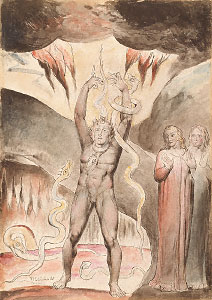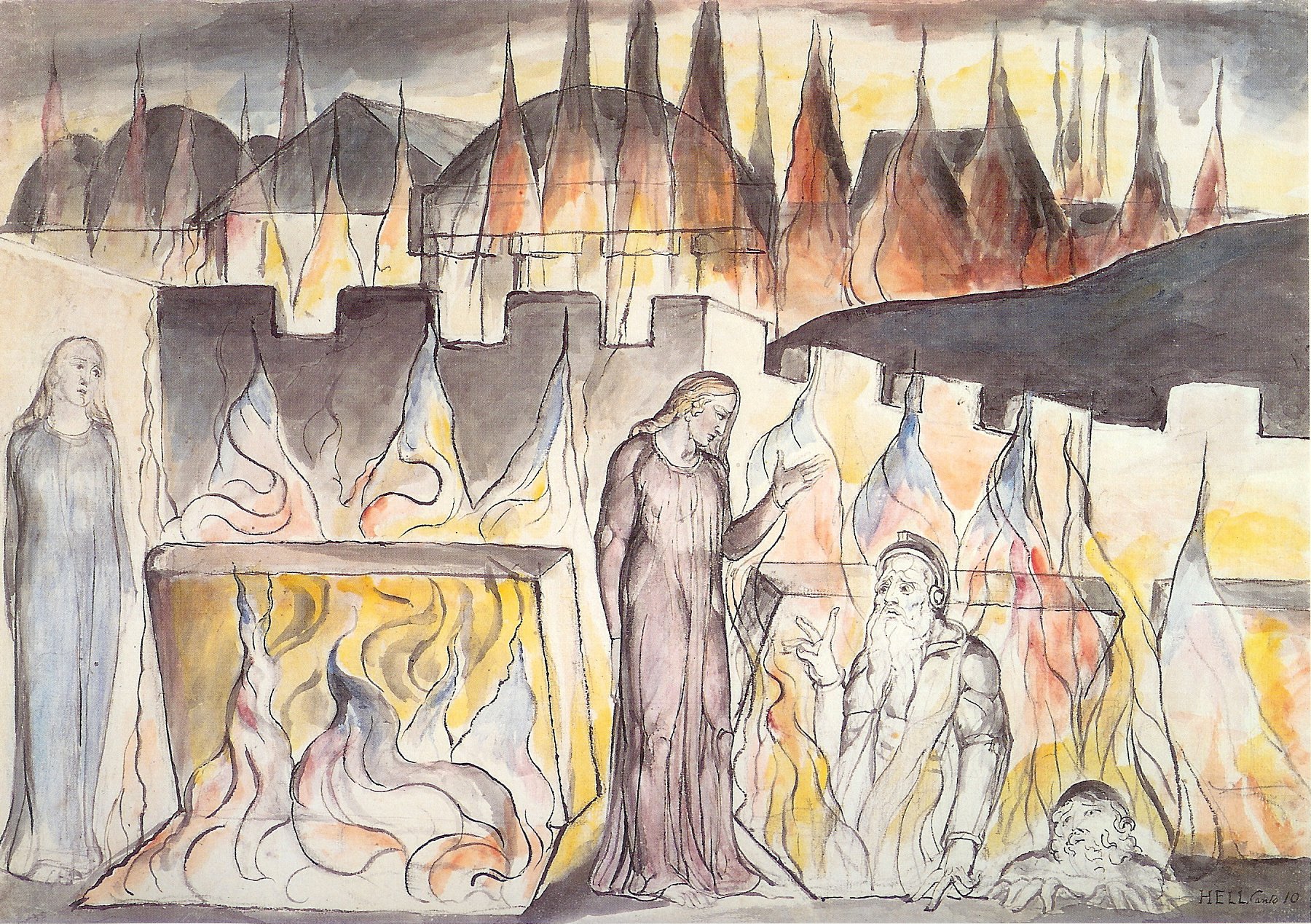
William Blake: Inferno, Canto XIX, 10-120, The Simoniac Pope
O Simon Magus, O forlorn disciples,
Ye who the things of God, which ought to be
The brides of holiness, rapaciously
For silver and for gold do prostitute,
Now it behoves for you the trumpet sound,
Because in this third Bolgia ye abide.
We had already on the following tomb
Ascended to that portion of the crag
Which o'er the middle of the moat hangs plumb.
Wisdom supreme, O how great art thou showest
In heaven, in earth, and in the evil world,
And with what justice doth thy power distribute!
I saw upon the sides and on the bottom
The livid stone with perforations filled,
All of one size, and every one was round.
To me less ample seemed they not, nor greater
Than those that in my beautiful Saint John
Are fashioned for the place of the baptisers,
And one of which, not many years ago,
I broke for some one, who was drowning in it;
Be this a seal all men to undeceive.
Out of the mouth of each one there protruded
The feet of a transgressor, and the legs
Up to the calf, the rest within remained.
In all of them the soles were both on fire;
Wherefore the joints so violently quivered,
They would have snapped asunder withes and bands.
Even as the flame of unctuous things is wont
To move upon the outer surface only,
So likewise was it there from heel to point.
"Master, who is that one who writhes himself,
More than his other comrades quivering,"
I said, "and whom a redder flame is sucking?"
And he to me: "If thou wilt have me bear thee
Down there along that bank which lowest lies,
From him thou'lt know his errors and himself."
And I: "What pleases thee, to me is pleasing;
Thou art my Lord, and knowest that I depart not
From thy desire, and knowest what is not spoken."
Straightway upon the fourth dike we arrived;
We turned, and on the left-hand side descended
Down to the bottom full of holes and narrow.
And the good Master yet from off his haunch
Deposed me not, till to the hole he brought me
Of him who so lamented with his shanks.
"Whoe'er thou art, that standest upside down,
O doleful soul, implanted like a stake,"
To say began I, "if thou canst, speak out."
I stood even as the friar who is confessing
The false assassin, who, when he is fixed,
Recalls him, so that death may be delayed.
And he cried out: "Dost thou stand there already,
Dost thou stand there already, Boniface?
By many years the record lied to me.
Art thou so early satiate with that wealth,
For which thou didst not fear to take by fraud
The beautiful Lady, and then work her woe?"
Such I became, as people are who stand,
Not comprehending what is answered them,
As if bemocked, and know not how to answer.
Then said Virgilius: "Say to him straightway,
'I am not he, I am not he thou thinkest.'"
And I replied as was imposed on me.
Whereat the spirit writhed with both his feet,
Then, sighing, with a voice of lamentation
Said to me: "Then what wantest thou of me?
If who I am thou carest so much to know,
That thou on that account hast crossed the bank,
Know that I vested was with the great mantle;
And truly was I son of the She-bear,
So eager to advance the cubs, that wealth
Above, and here myself, I pocketed.
Beneath my head the others are dragged down
Who have preceded me in simony,
Flattened along the fissure of the rock.
Below there I shall likewise fall, whenever
That one shall come who I believed thou wast,
What time the sudden question I proposed.
But longer I my feet already toast,
And here have been in this way upside down,
Than he will planted stay with reddened feet;
For after him shall come of fouler deed
From tow'rds the west a Pastor without law,
Such as befits to cover him and me.
New Jason will he be, of whom we read
In Maccabees; and as his king was pliant,
So he who governs France shall be to this one."
I do not know if I were here too bold,
That him I answered only in this metre:
"I pray thee tell me now how great a treasure
Our Lord demanded of Saint Peter first,
Before he put the keys into his keeping?
Truly he nothing asked but 'Follow me.'
Nor Peter nor the rest asked of Matthias
Silver or gold, when he by lot was chosen
Unto the place the guilty soul had lost.
Therefore stay here, for thou art justly punished,
And keep safe guard o'er the ill-gotten money,
Which caused thee to be valiant against Charles.
And were it not that still forbids it me
The reverence for the keys superlative
Thou hadst in keeping in the gladsome life,
I would make use of words more grievous still;
Because your avarice afflicts the world,
Trampling the good and lifting the depraved.
The Evangelist you Pastors had in mind,
When she who sitteth upon many waters
To fornicate with kings by him was seen;
The same who with the seven heads was born,
And power and strength from the ten horns received,
So long as virtue to her spouse was pleasing.
Ye have made yourselves a god of gold and silver;
And from the idolater how differ ye,
Save that he one, and ye a hundred worship?
Ah, Constantine! of how much ill was mother,
Not thy conversion, but that marriage dower
Which the first wealthy Father took from thee!"
And while I sang to him such notes as these,
Either that anger or that conscience stung him,
He struggled violently with both his feet.
I think in sooth that it my Leader pleased,
With such contented lip he listened ever
Unto the sound of the true words expressed.
Therefore with both his arms he took me up,
And when he had me all upon his breast,
Remounted by the way where he descended.
Nor did he tire to have me clasped to him;
But bore me to the summit of the arch
Which from the fourth dike to the fifth is passage.
There tenderly he laid his burden down,
Tenderly on the crag uneven and steep,
That would have been hard passage for the goats:
Thence was unveiled to me another valley.


_The_Baffled_Devils_Fighting.jpg)

_The_Six-Footed_Serpent_Attacking_Agnolo_Brunelleschi.jpg)

_Ciampolo_the_Barrator_Tormented_by_the_Devils.jpg/800px-Blake's_Illustrations_of_Dante%2C_object_3_(Bentley_448-2)_Ciampolo_the_Barrator_Tormented_by_the_Devils.jpg)




